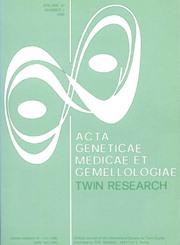Article contents
The Hybrid Specialty of Psychiatric Genetics
Published online by Cambridge University Press: 01 August 2014
Extract
No matter what our everyday activity in the mental health field, we can say with conviction that the function of a new superspecialty such as Psychiatric Genetics, the subject of this late-morning session, is profoundly influenced by contemporary cultural, social and political conditions as well as by the never-ending challenge of scientific conquests. Evidently, therefore, any attempt to formulate a concise and generally acceptable definition of such a modern hybrid discipline is no less difficult than it is to work in it. Actually, since the two parental sciences deal with equally absorbing, intricate and still rather speculative aspects of human existence and health, it would make little difference here if the given definition were developed within the framework of psychiatry or that of human genetics. What is certain only is the empirical observation that there are very few workers in this particular field of superspecialization, who are not prematurely grey or otherwise debilitated.
In order to facilitate a fruitful discussion despite these considerable difficulties, it may be advisable to use a description of psychiatry and its various schools of psychotherapy, which is plain in its formulation and is focused on appropriate medical concepts and techniques from a professional standpoint. This selective procedure is justified, since in many recent conferences on the functions of clinical psychiatry, increasing emphasis has been placed on two general professional requirements. One of them is that psychiatry should never be “a field apart from other areas of scientific discourse”. The other criterion is that a psychiatrist be “a good physician first and always… capable of acting as the trustworthy friend, the wise counsellor, and the discreet and skillful servant” of people in distress.
- Type
- Sessione di Conferenze/Lecture Session (11 Settembre)
- Information
- Acta geneticae medicae et gemellologiae: twin research , Volume 11 , Issue 3 , July 1962 , pp. 317 - 320
- Copyright
- Copyright © The International Society for Twin Studies 1962
References
- 2
- Cited by


